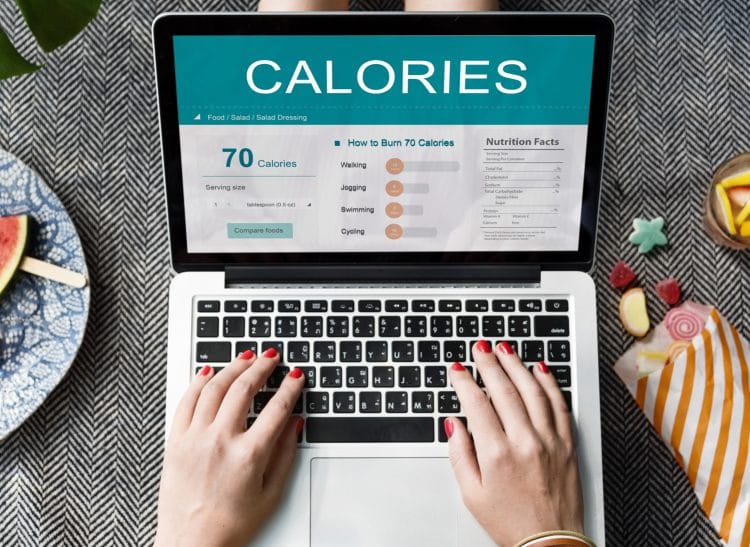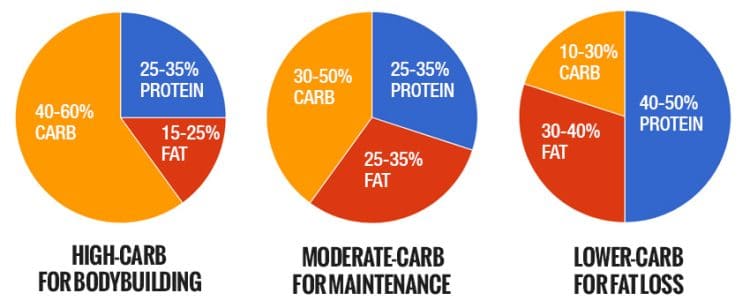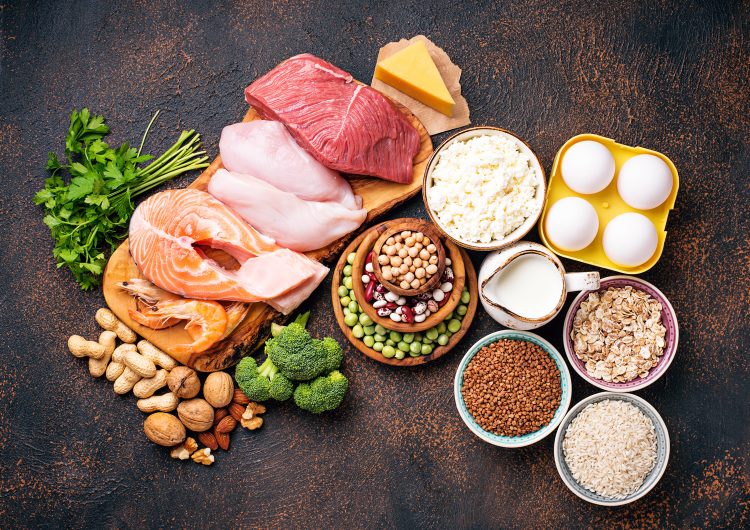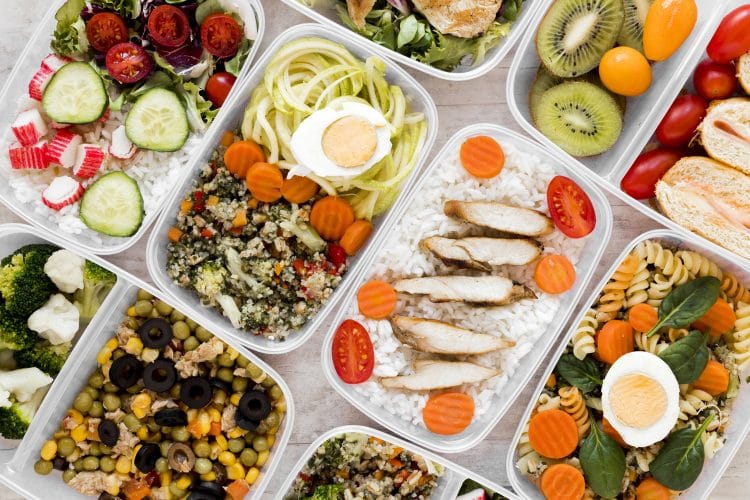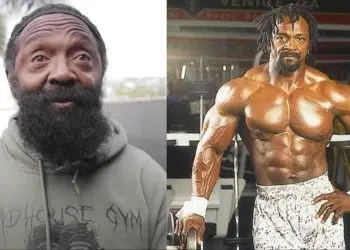According to most nutrition experts, the average man needs to eat around 2,000 to 2,500 calories per day. This should provide enough energy and nutrients to keep your body functioning and fuel a moderate amount of light exercise – say 30-40 minutes 3-4 times a week.
However, if you want to build muscle, are more active than average, or have a larger body size, 2,000 to 2,500 calories are not enough. Eating this many calories could impair muscle growth, and you could even find yourself losing rather than gaining weight.
Also, building muscle requires longer and often more frequent workouts, which also increases your calorific needs.
So, and especially if you are struggling to gain muscle or weight, you may need to eat more than the recommended 2,000 to 2,500 calories a day.
How much more depends on your calorie needs, which you can estimate using this calculator. However, for a lot of lifters, 3,000 calories is a good place to start.
In this article, we explain the best way to eat to build muscle and provide you with a sample 3,000-calorie meal plan to follow.
Level Up Your Fitness: Join our 💪 strong community in Fitness Volt Newsletter. Get daily inspiration, expert-backed workouts, nutrition tips, the latest in strength sports, and the support you need to reach your goals. Subscribe for free!
Nutrition for Gaining Weight
The Calories
Eating to gain weight is easy; just chow down a whole lot of junk food, and you’ll soon start piling on the pounds! After all, millions of overweight people do precisely this, so how hard can it be, right?
But, if you care about your health, your physical performance, and how you look, the last thing you want to do is gain a whole lot of fat weight. Instead, you want to build muscle while accumulating as little body fat as possible. This is called lean bulking.
Lean bulking involves eating a little more than you need to maintain your current body weight. This creates a modest calorie surplus. Your body will then use these extra calories to fuel your workouts and build muscle. However, there should not be so many extra calories that you start gaining lots of unwanted body fat.
Eating 3,000 calories a day will give the average person a 500 to 1,000 calorie surplus, which is more than enough for building muscle.
In fact, if you are slightly built, have a slow metabolism, or gain fat easily, 3,000 may be too much, and you could end up gaining unwanted body fat. If, after a few weeks, you feel that your waist is getting bigger faster than your biceps, you may want to dial back to 2,500 to 2,700.
The Macros
Macronutrients, or macros for short, is the collective term for protein, carbohydrate, and fat. While the number of calories you eat matters, so does the amount of each macronutrient.
Protein is arguably the most important macro for building muscle. Your body uses protein for muscle repair and growth. Eating too little protein could undermine your workouts and stop you from making progress, even if you are consuming sufficient calories. Most exercisers should consume around one gram of protein per pound of bodyweight.
Tip: You can estimate your protein intake using this calculator.
The next macro is carbohydrate. Your body uses carbs for energy, especially during high-intensity exercise, like bodybuilding training. Carbs are broken down into glucose and then stored in your muscles as glycogen. Your body uses the glycogen to power your muscles. While some exercisers purposely cut carbs to lose weight, if you want to build muscle, carbs are all but essential for most people.
The final macronutrient is fat. Fat is often maligned and said to be unhealthy, but that fails to take into account that there are several different types of fat, and some of them are actually critical.
Your body uses fat for energy during low-intensity exercise, such as easy cardio. It’s also important for the synthesis of anabolic or muscle-building hormones. While low-fat diets can be helpful for fat loss, if you want to gain muscle, some dietary fats are essential. You’ll also need fats to help you reach your 3,000-calorie target.
The relationship between these nutrients is called your macro ratio or macro balance. There are several different macro options to choose from, and it’s usually best to adjust your macros based on your current training goal, i.e.:
As most people following a 3,000-calorie eating plan are looking to gain weight, we’ll be using a carb/protein/fat balance of 40-60%/25-35%/15-25% in most of the meals.
Related Calculators:
Foods to Eat and Foods to Avoid
You are what you eat, or so the saying goes. If you want to be healthy, you need to eat healthily. So, most of your muscle-building diet should comprise natural, unprocessed foods, and you should generally avoid junk food and anything that’s not nutritious.
Good bodybuilding staple foods include:
- Meat
- Fish
- Poultry
- Eggs
- Rice
- Beans
- Potatoes
- Leafy green vegetables
- Bananas
Examples of the sorts of food you should try and steer clear of include:
- Candy
- Takeouts
- Soda
- Potato chips
- Frozen “ready” meals
- Pizza
- Sugary breakfast cereals
- Baked goods, e.g., waffles, cakes, cookies, etc.
That said, eating 3,000 calories a day will be much more challenging if you eat low-calorie foods. You may need to include some high-calorie foods to make consuming all those calories easier.
Examples of healthy but high-calorie foods include:
- Peanut butter
- Nuts
- Avocados
- Seeds
- Full fat dairy
- Beef
- Oily fish
- Whole grains
- Olive oil
- Coconut oil
So, while your diet should primarily be natural and healthy, you may still need to seek out higher calorie foods to make hitting 3,000 calories a day more manageable. The occasional less healthy snack or meal won’t hurt you, providing you hit your macro and calorie intake target. However, the majority of your meals should be as nutritious as possible.
Level Up Your Fitness: Join our 💪 strong community in Fitness Volt Newsletter. Get daily inspiration, expert-backed workouts, nutrition tips, the latest in strength sports, and the support you need to reach your goals. Subscribe for free!
Meal Frequency
One of the reasons many people find it so hard to gain weight is that they cannot physically eat enough food. They feel full all the time and end up consuming too few calories. The easiest way around this problem is to eat more frequently. That way, each meal can be smaller and more manageable.
For this reason, it’s usually best to eat three moderate-sized meals a day and several smaller snacks. Fewer meals will be harder to eat and digest.
That’s not to say you CAN’T eat just two big meals and a snack or two a day if that works for you. But, if you have a small appetite, as many underweight people do, smaller meals will make eating 3,000 calories a day much more manageable.
3,000 Calorie Meal Plan
With all the information above, you should be able to create your own 3,000-calorie meal plan for building muscle without gaining much fat. But, to save you the bother, here is a sample one-day meal plan to follow:
(Please note: all calorie values are approximate).
Breakfast
- 6 eggs, scrambled
- 1 cup oatmeal
- 1 tablespoon peanut butter
Total: 730 calories
Snack 1
- Protein bar
- 1 apple
Total: 325 calories
Lunch
- 7 oz grilled chicken breast
- 7 oz sweet potato
- 2 cups broccoli
- 2 teaspoons olive oil
Total: 675 calories
Snack 2
- 2 scoops of whey protein
- 1 banana
Total: 400 calories
Dinner
- 7 oz white fish
- 1 cup cooked brown rice
- 3 cups of greens, e.g., spinach
- ½ avocado
- 1 tablespoon olive oil
Total: 675 calories
Pre-bed snack
- 1 cup low-fat cottage cheese
- 1 diced tomato
Total: 195 calories
Daily total: 3,000 calories
Related Calculators:
- Calories Per Meal Calculator
- How Many Calories To Eat Per Day Calculator
- Time To Burn Calories Eaten Calculator
- Calorie Deficit Calculator
- Find Your Total Daily Energy Expenditure
FAQs
Got a question about eating for weight gain? We’ve got answers!
1. Regarding the meal plan, can I follow it every day?
While the meal plan is balanced and contains plenty of healthy foods, you’ll probably get bored of it if you eat the same thing every day. So, use it as an example and make substitutions to keep things interesting.
For example, you can eat different vegetables, or switch the protein sources, e.g., have lean beef instead of chicken or tuna instead of white fish.
2. I don’t like xyz food – can I eat something else?
You bet! But, if you make substitutions, make sure you replace one food with something similar. For example, you can have turkey instead of fish as both foods are high in protein. But, replacing fish with oatmeal would not work as they’re entirely different food groups.
3. How much water should I drink?
Shoot for a minimum of 72 fluid ounces per day. This will keep you hydrated and help your body flush away toxins and impurities. However, take care not to drink water shortly before or during your main meals as it can be filling and could stop you from finishing your food.
Estimate your water intake requirements using this calculator.
4. Can I replace one of the meals or snacks with a mass gainer shake?
Mass gainer shakes are very useful during a bulking diet. They contain plenty of calories, protein, and carbs but aren’t too filling and are easy to make. They’re ideal anytime you are unable to cook or eat a solid meal.
Feel free to replace a meal per day with a mass gainer shake, but make sure its caloric value roughly matches whatever meal you were supposed to eat. However, it’s usually best to get most of your nutrients and calories from natural foods, which are generally healthier.
5. Do I have to lift weights to gain muscle?
While consuming more calories than usual will lead to weight gain, most of that weight will be fat if you don’t engage in strength training. So, if you want to build muscle, you must lift weights. However, the type of weights you lift is not really all that important, and there are many different ways to challenge your muscles to make them grow, including:
- Dumbbells
- Barbells
- Bodyweight exercises
- Kettlebells
- Resistance bands
- Isometrics
- Resistance machines
You can pick one training method or, better still, use several different ones to keep your workouts fresh and interesting.
Check out our workout library for 1000s of tried-and-tested muscle-building plans and programs.
3000 Calorie Meal Plan – Wrapping Up
Muscles are broken down in the gym but built in the kitchen. Intense training takes a lot out of your body, and your diet must support your workouts, or your hard work won’t produce the results you want.
Nine times out of ten, being unable to gain weight means you aren’t eating enough. A lot of lifters, especially hard gainers and beginners, fail to consume enough calories or protein; they’re basically running on empty and trying to build muscle out of thin air!
Use these nutrition guidelines and 3,000-calorie meal plan to give your body gets what it needs to train, recover, and grow.

